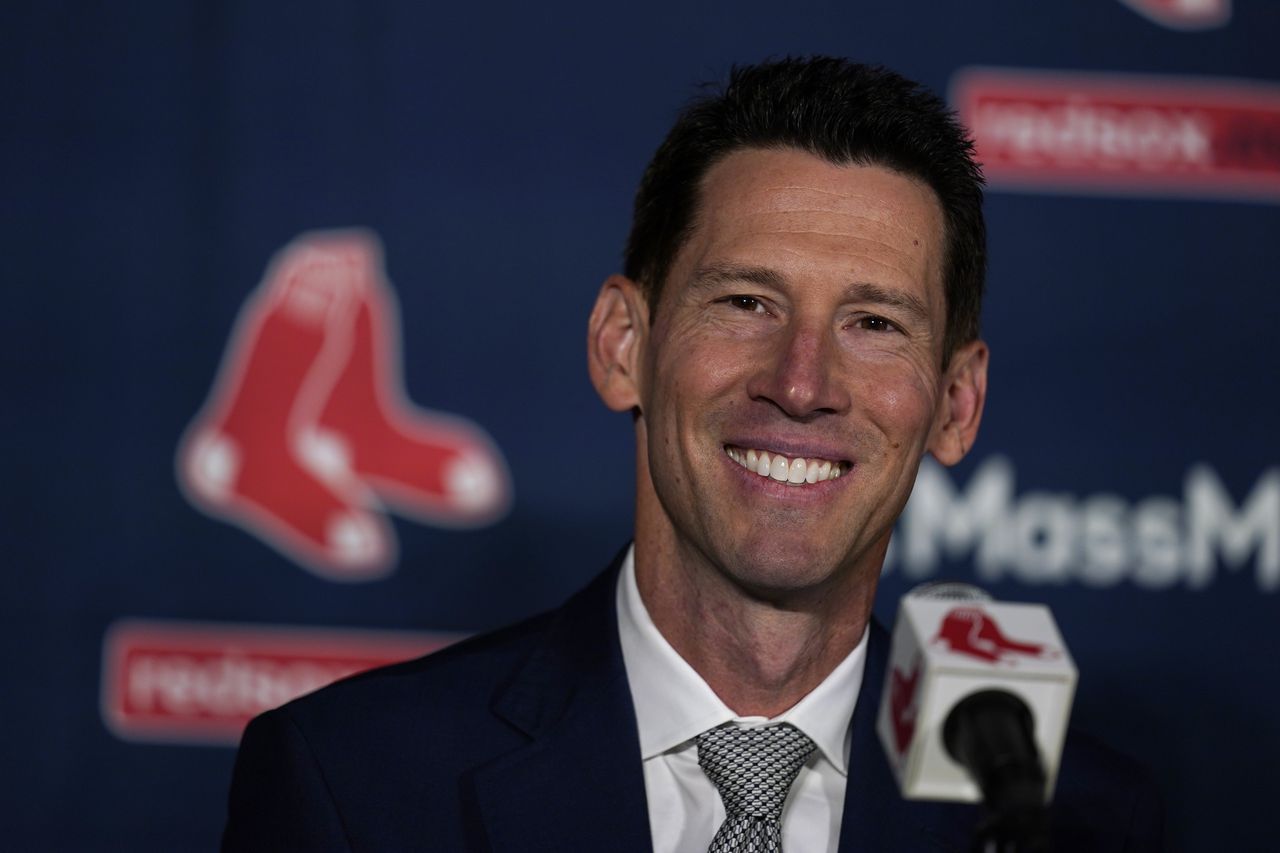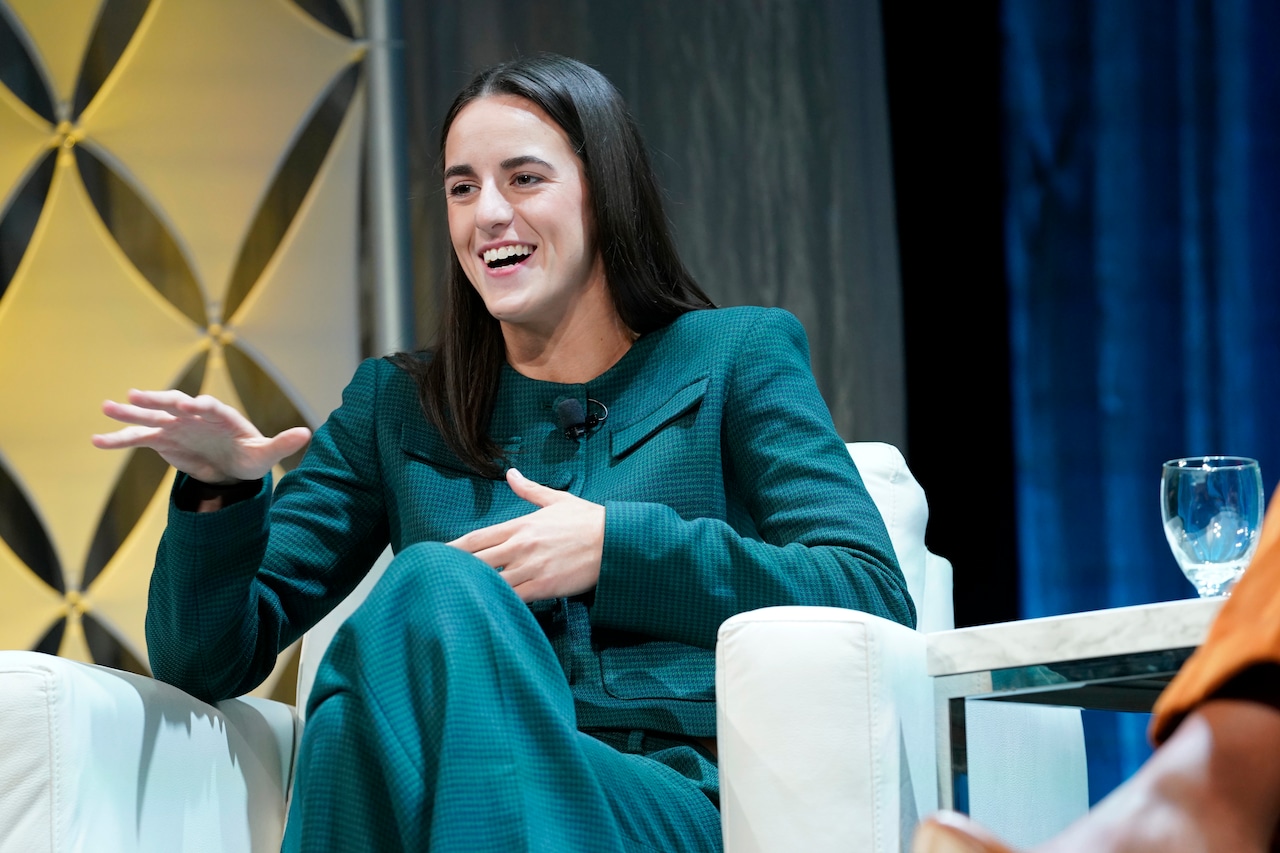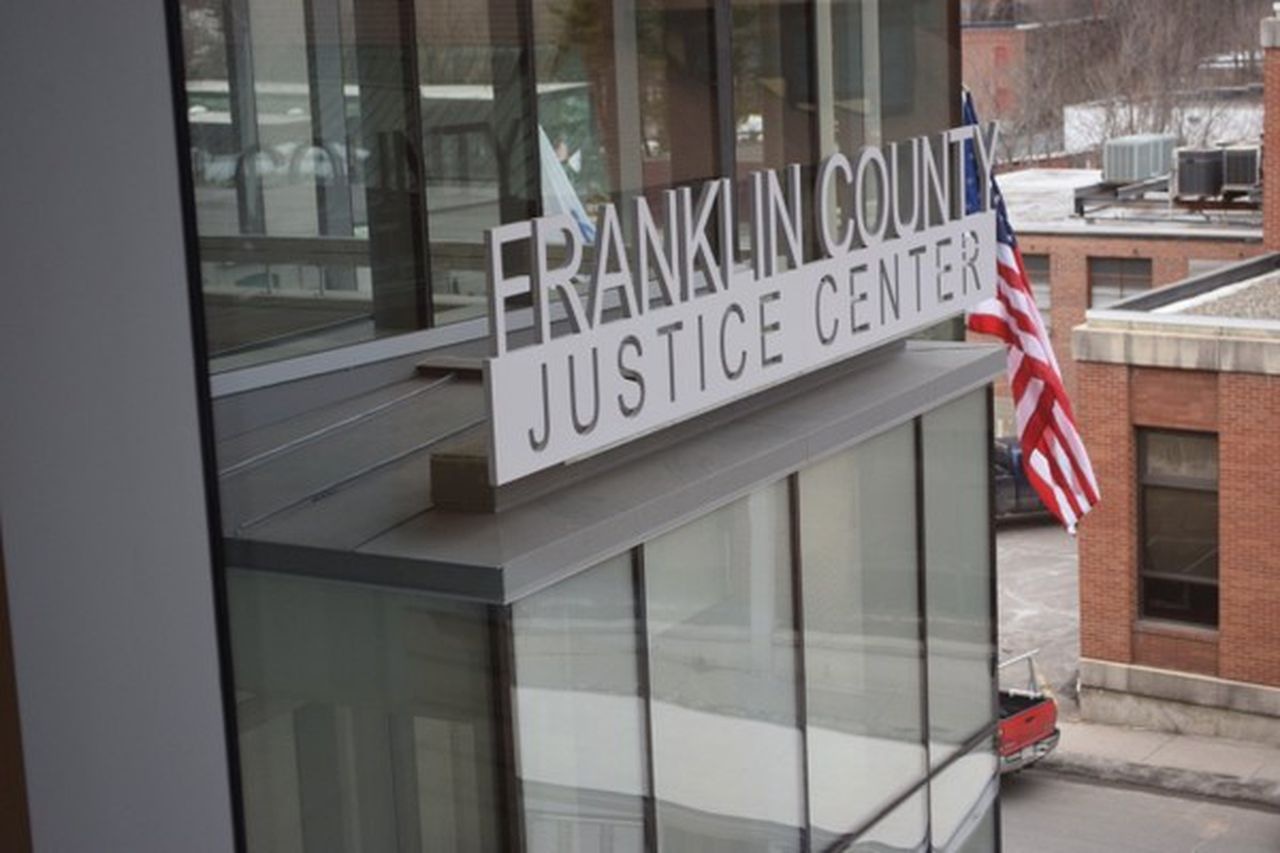
There was bound to be no shortage of hot takes following Craig Breslow’s introductory press conference Thursday morning. And sure enough, everywhere you looked, there they were: online, on the air and anywhere else opinions get expressed these days.
The reactions, too, were varied. For some, Breslow was “energized,” and “confident.” Some were wowed by his enthusiasm and assuredness. Others complained that he was too vague, spoke in generalities or — and this was a common one — complained that he sounded too much like a “nerd.” Seems there were a few too many uses of “synthesized” for some people’s tastes.
It’s unclear what it was that people expected. Was Breslow supposed to offer a PowerPoint presentation, detailing which free agents he was going to sign (and for how much), while identifying trade targets and revealing which prospects he’d be willing to deal?
This was a press conference, a chance for the Red Sox to (re)introduce Breslow to the fan base. It was an opportunity for him to address the fan base, for the team to give itself a public cleansing, and for some pictures to be taken. Along the way, Breslow answered some questions without offering much in the way of specifics — as might be expected in that setting.
It was not intended to be a pull-back on the curtain, a dramatic reveal with specific action items identified for the offseason. Those don’t happen anywhere, with any pro teams, in any sport, so why anyone expected one at Fenway this week is unclear.
A healthy amount of skepticism was warranted. When you’ve finished last two straight years and last three times in the last four years, it’s fair to say that, as a franchise and a business, the Red Sox have lost their way. They’ve squandered a lot of the good will that came with winning four titles between 2004 and 2018, and the team’s pattern of turfing chief baseball executives every three-and-half to four years, like clockwork, has put them in a precarious state.
Again, the Red Sox have invited all of this scorn and derision, and part of that has been led by the revolving door they’ve installed for their front office.
Now, the responsibility to change that tattered reputation falls to Breslow, assuming he’s allowed — to use the most hackneyed of current sports phrases — to cook.
There’s plenty of evidence to suggest that Breslow has more leverage than did his predecessor. When the Red Sox hired Chaim Bloom, they were only a season removed from winning 108 regular season games and staging another championship parade. They had a popular manager and a star-studded major league roster.
That afforded them the ability to cut payroll and retrench some. The fans had been satiated with a number of division titles and two world championships in the previous six seasons.
The Sox aren’t nearly in the same position now. Last place finishes, which they had largely avoided for decades, have now become regular occurrences. Locally, the team has become almost an after-thought on sports talk radio, referenced only as a punch-line or when it serves the hosts’ comedic purposes.
On Thursday, “another nerd” was the phrase of the day. That, and mocking principal owner John Henry’s tardy and silent presence at his own team’s event.
Breslow can’t change that narrative or the blizzard of hot takes that greeted him, and he shouldn’t for a minute spend time worrying whether he “won” the press conference. That’s never been less important.
What is essential is that he take whatever bold steps he deems necessary to lug the Red Sox back into prominence and relevance. And already, there’s evidence that he stands ready to take the necessary steps.
Not long after the main press conference ended, Breslow slipped away to conduct another interview with NESN’s Tom Caron and Lenny DiNardo. Removed from the trappings of the press conference, where a hundred or so fellow employees were in the room watching, Breslow was more candid, with his guard dropped.
Asked about working with an already fully-staffed Baseball Operations department, full of long-term employees, Breslow, unprompted, didn’t hold back.
“Certainly, there will be difficult conversations coming,” said Breslow. “I think it’s important to get fresh perspective and turnover, at times, can bring that.”
Well, then.
Understand, I’m not rooting for anyone to lose their job. But Breslow seemed to be signaling that he intends to put his stamp on the Red Sox. Some fixtures might be let go, presumably replaced, over time, with people of his own choosing. Which is how it should have been in the first place.
That willingness to upset the apple cart is a positive sign. Breslow can, according to some, be a demanding boss, with clear expectations to do things his way.
One person who knows him well said succinctly as the interview process was unfolding: “Craig is no shrinking violet.”
The Red Sox should welcome that decisiveness, even if ruffles some and causes unrest. To me, the most important declaration of the press conference came when Breslow said: “I have the willingness and conviction to make the tough decisions necessary in this role.”
There was also this: “The goal is not to create the most competitive minor league team.” That suggests that Breslow will not hesitate to move prospects to better the talent at the major league level.
The fan base will welcome that aggressiveness. Bloom got a raw deal with his firing, and his contributions to the next great Red Sox team will be substantial. He rebuilt the minor league system, paid attention to the details, and improved the team’s analytics department greatly. He did everything he was hired to do and more, and he did it with integrity.
But at times, he failed to seize the moment — either in free agent negotiations or at the trade deadline, and the major league team failed to show sufficient progress over his four years.
Breslow gets a chance to do that now, and it would appear that he’s not about to shrink from the challenge.
“I think decision-making is the most important part of any leadership role,” said Red Sox CEO and President Sam Kennedy, who led the search that resulted in Breslow’s hiring.
Ultimately, Breslow will be judged not by his managerial style, but by the results. Can he make the Red Sox consistent contenders again? Can he get them to a point where an off-year results in 84 wins, not 72? Can he bring his Pitching Whisperer skills to the minor league system and end the 15-year drought the team has weathered when it comes to developing homegrown starting pitchers?
Can he attract big-name talent? Can he make the Red Sox a destination point for free agents? Can he identify talent? Can he scout his team’s own minor league system and determine which prospects can play and which can be dealt to acquire help for the major league roster?
Those are the real tests, the real basis upon which he’ll be evaluated.
Because a year or two from now, no one is going to be obsess over the number of multisyllabic words he used in his first media availability. It won’t matter whether he won the press conference any more than it matters when teams “win the winter.”
There’s a standard here, or at least there used to be. If Breslow’s baseball acumen and leadership skills bring the Red Sox back to consistent contender status, that will be the ultimate sign of success.
__________________
Some thoughts on a rather ordinary World Series:
* It was a sad commentary that the Arizona Diamondbacks were left to go with a bullpen game for the fourth game of the World Series. No, this wasn’t a strategic call on their part, or a chosen plan of attack; it simply reflected that a team which somehow won the National League pennant didn’t have a serviceable fourth starter that it could entrust.
So much for the great World Series pitching matchups we’ve had the pleasure of watching — Lonborg vs. Gibson, Morris vs. Smoltz, Clemens vs. Schilling. Instead, in the top of the first inning, the Diamondbacks had a reliever warming three pitches into the game.
It may not be easy putting the proverbial genie back into the bottle here. If starters are going to again be expected to go six or seven innings, it will have to start in the minors, and arm strength will have to be built up. But good for Rob Manfred’s threat to limit clubs to just 12 pitchers on active rosters soon, as some managers have used the presence of 13 pitchers as a crutch, routinely making changes at the first hint of trouble. In the process, pitchers aren’t conditioned to pitch deep into game.
* In the aftermath of the Rangers’ first World Series title, there was much praise for Texas owner Ray Davis, who spent liberally the last two offseasons, signing free agents Marcus Semien, Corey Seager, Jacob deGrom, Nathan Eovaldi and others to lucrative contracts. And good for Davis for delivering a championship to a long-suffering fan base.
But as the Padres, Mets, Yankees and others reminded us this season, a giant payroll is no guarantee of success. The three top-spending teams all finished out of the postseason, and only two of those three had a winning record (the Yankees and Padres each rallied in September to finish a game over .500).
Remember, too, that the Rangers will be paying for 2023 for a while. Seager has eight years remaining, while deGrom has $155 million guaranteed over the next four years, and will not pitch in 2024 when he’s earning $40 million. The team will also pay Max Scherzer, acquired at the deadline, more than $20 million next year.
In the meantime, the Athletic reported that the Padres had to borrow $50 million to make their end-of-season payroll. For the last few years, many in the game wondered how a team in a relatively small TV market could sustain such a huge payroll. Turns out, it couldn’t.
* Not that Bruce Bochy needed to burnish his credentials for Cooperstown, but his fourth World Series title further guarantees his induction for the Hall of Fame. Bochy is one of six managers to have won four World Series, and one of three managers to take three different teams to the World Series (he also guided the Padres there in 1998 before going on to win three rings with the Giants and his most recent with the Rangers).
Bochy’s impact was huge, of course, and a reminder that great managers can make a difference. In recent year, the trend in the game has shifted to younger managers, who not incidentally, make far more modest salaries because of their inexperience. But the last three World Series-winning managers – Bochy, Dusty Baker and Atlanta’s Brian Snitker — have decades of experience, and in the cases of Baker and Bochy, were handsomely paid.
* The Series served as a great platform for Torey Lovullo, who is one of the most well-liked people in the game. Lovullo’s sunny personality and people skills shone through in his media availabilities and in-game interviews. It was obvious when Lovullo served as John Farrell’s bench coach — and while Farrell battled cancer, interim manager — that Lovullo was going to be a success somewhere, given the chance. Now, he and Mike Hazen have forged a great baseball partnership and friendship.
EXTRA INNINGS
1) This may sound foolish, given that they got nothing out of him for the entire season due to a mysteriously lingering knee injury, but it might be worth the Red Sox giving Adalberto Mondesi another chance — if they have evidence he can be healthy by spring training. They could probably bring him back on a minor league deal with no risk involved. Mondesi could compete for the second base job. He’s a superb middle infield defender and given how poor the team’s defense was all over the infield until Trevor Story returned, they can use all the athleticism they can get.
2) If MLB awards World Series umpiring assignments based on merit, how is it some of the six umps chosen for this year’s Series were ranked so low during the year? The website Umpire Scorecard published their rankings of the balls-and-strikes accuracy of the six umps, and a few finished in the bottom half of the rankings. Most of the games were well officiated, but Game 3, with Alphonso Marquez behind the plate, featured several atrocious calls. In an era when every pitch and every call on the bases is scored for accuracy by MLB, why is it so difficult to have the best half-dozen umps working the game’s premier event?
3) Buck Showalter is emerging as the favorite to be hired in Anaheim, but I can’t help but pull for Ron Roenicke, who’s also interviewed for the opening. Roenicke is a great instructor, relates well to players and deserves another chance after experiencing the 2020 season in Boston, when he had to deal with a substandard pitching staff and the myriad challenges of the pandemic-shortened season.





